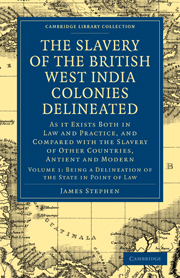 The Slavery of the British West India Colonies Delineated
The Slavery of the British West India Colonies Delineated Book contents
- Frontmatter
- PREFACE
- Contents
- PRELIMINARY CHAPTER: Of the Necessity and Importance of describing the State in question, and the general Plan of the Work
- BOOK I OF THE SLAVERY OF OUR COLONIES CONSIDERED AS A LEGAL INSTITUTION
- CHAPTER I Of the Origin and Authority of the Colonial Slave Laws in general
- CHAPTER II Of the Persons who are subject to Slavery in our Colonies
- CHAPTER III Of the legal Nature and Incidents of this Condition, as they respect and constitute the Relation between the Slave and his Master
- CHAPTER IV Of the legal Nature and Incidents of Colonial Slavery, as they respect its Relations to Persons of Free Condition in general, the Master and his Delegates excepted
- CHAPTER V Of the legal Nature and Incidents of West India Slavery, in its Relations to the Police and Civil Government of the Country
- CHAPTER VI Of this State of Slavery in respect of its Commencement and Dissolution
- Appendix, No. 1
- Appendix, No. II
- Appendix, No. III
- Appendix, No. IV
- Appendix, No. V
CHAPTER IV - Of the legal Nature and Incidents of Colonial Slavery, as they respect its Relations to Persons of Free Condition in general, the Master and his Delegates excepted
Published online by Cambridge University Press: 07 October 2011
- Frontmatter
- PREFACE
- Contents
- PRELIMINARY CHAPTER: Of the Necessity and Importance of describing the State in question, and the general Plan of the Work
- BOOK I OF THE SLAVERY OF OUR COLONIES CONSIDERED AS A LEGAL INSTITUTION
- CHAPTER I Of the Origin and Authority of the Colonial Slave Laws in general
- CHAPTER II Of the Persons who are subject to Slavery in our Colonies
- CHAPTER III Of the legal Nature and Incidents of this Condition, as they respect and constitute the Relation between the Slave and his Master
- CHAPTER IV Of the legal Nature and Incidents of Colonial Slavery, as they respect its Relations to Persons of Free Condition in general, the Master and his Delegates excepted
- CHAPTER V Of the legal Nature and Incidents of West India Slavery, in its Relations to the Police and Civil Government of the Country
- CHAPTER VI Of this State of Slavery in respect of its Commencement and Dissolution
- Appendix, No. 1
- Appendix, No. II
- Appendix, No. III
- Appendix, No. IV
- Appendix, No. V
Summary
The enslaved peasant attached to an extensive domain, as in Russia or Poland, may find his legal relations to free persons in general, of little moment to his security or welfare.—To him, the lord, the family and the agents of the lord, and his brother bondmen, constitute, for every important purpose, the whole community; for as it is with them alone that he has any ordinary intercourse, from their hands only, can he often receive either good or evil.
Such must have been generally the case with all territorial slaves in ancient Europe; and probably is so in every country in which such men are still to be found, except in the western world.
But the plantation negro in our colonies, is exposed to daily intercourse with free persons who are wholly unconnected with the owner to whom he belongs.—He cannot attend the team to a town or shipping place, go to the market or neighbouring rivulet, or pass on any occasion beyond the boundaries of the estate, without meeting white persons, who possess, in regard to him, neither the rights nor feelings of a master.
The household slave, has naturally a still more frequent and extensive intercourse with free persons not of the master's family, especially when resident in a town. Unless, therefore, morals and manners are so singularly pure in the West Indies, as to supply the place of laws, the subject now under consideration must be one of no trivial consequence to the security and well being of the slaves.
- Type
- Chapter
- Information
- The Slavery of the British West India Colonies DelineatedAs it Exists Both in Law and Practice, and Compared with the Slavery of Other Countries, Antient and Modern, pp. 129 - 195Publisher: Cambridge University PressPrint publication year: 2010First published in: 1824


